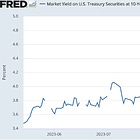BRIEFLY NOTED: For 2023-11-24 Fr
The reality of Bayesian-distribution tails; Britain’s George Osborne imagines that not friendship but money is magic; Team Transitory!; you should read Matt Yglesias especially if you find him...
The reality of Bayesian-distribution tails; Britain’s George Osborne imagines that not friendship but money is magic; Team Transitory!; you should read Matt Yglesias especially if you find him annoying; Republicans as cause & effect of major societal failure; Andrej Karpathy on LLMs; very briefly noted: & notes on the OpenAI coup, index funds & private equity making the economy less fair?, & BRIEFLY NOTED: For 2023-11-19 Su…
SubStack NOTES:
Economics: As I understand things, both Sam Bankman-Fried and Carolyn Ellison’s Totenrit into bankruptcy on the one hand and Helen Toner, Tasha McCauley, Adam D’Angelo, and Ilya Sutskever’s decision that they had to remove Sam Altman from OpenAI by stealth and sudden coup because they dared not discuss things lest he use his persuasive skills on the other—both of these hinged on a belief that the tails of the distribution should dominate decision making. The tails, for them, are very, very real—are, in a sense, the only real thing. But are the tails really real, or just a conceptual and mathematical artifact?:
Neoliberal Nincompoops: I confess: not what I was expecting in reply to Dan Davies! It seems that the neighborhood of Twitter has changed somewhat since Elon Musk took over...
Returning to Dan Davies’s tweet, am I reading this right? That George Osborne imagines that money is magic? That with sufficient money one can summon anything and everything that one can imagine—even spirits from the vasty deep—unproblematically?
Keynes used to complain about people who thought lack of money was an independent binding constraint in addition to lack of resources. But I don't think he ever thought anyone would need to complain about people who thought that the presence of money was all by itself magic so that one never had to worry about lack of resources.
Where does this particular branch of HM Treasury mental insanity come from?:
Economics: At this point it really does seem overwhelmingly likely to me that—as with the post-WWII demobilization, and as with tbe Korean War-Cold War remobilization inflation—the wave has passed leaving no significant legacy for the economy. Structural change took place. Bottlenecks emerged. The price system responded, and resources flowed. And so the economy quickly got itself into a more-productive full-employment configuration at the price of a step-up in the price level. There is little not to like economically. But are there serious things not to like politically?
Public Reason: I confess I have never been able to fully grok Max Weber's metaphor "politics is a strong and slow boring of hard boards" in his “Politics as a Vocation” speech. First of all, in modern English "boring" almost invariably means something different from "to make a hole". Second, my first reaction on understanding the meaning of ”boring” was and is: No it isn't! Why doesn't he go find his cordless drill? It is something that makes sense only to a pre-Applied Science Age world.
Be that as it may, Matt Yglesias chose it for the title of his SubStack, which I very much recommend, especially because I find myself often annoyed by it but rarely able to convincingly dispute it:
War: Hamas consists of (a) ideas, (b) money, and (c) militants. ISIL had ideas and militants, but no outside money. Hence it could be suppressed by force of arms, as military defeat and the demonstration that it had failed at controlling territory robbed its ideas of their force, and war killed its militants. The cost was very high. Perhaps 40,000 civilian dead in ISIL’s suppression? That is fewer civilian deaths than had ISIL taken over and ruled substantial eras of Iraq and Syria for any length of time. But still.
The Netanyahu government is now well more than 1/8 of the way to that total, but given that it was no weapons to bring to bear against Hamas’s money and that each bombing strike creates more relatives of the dead as potential recruits to militancy, the Netanyahu government has no strategy that looks to me to have even a small chance of suppressing Hamas.
So I despair. And Dan Drezner despairs:
ONE IMAGE: Republicans as Cause & Effect of Major Societal Failure:

<https://www.medrxiv.org/content/10.1101/2020.10.26.20220111v2.full>
ONE VIDEO: Andrej Karpathy: Introduction to Large Language Models:
Very Briefly Noted:
Garfield Reynolds: The Weekly Fix: Be Thankful That the Hiking Cycle Looks Over: ‘Bonds extended this month’s stunning rally to wipe out losses for most major markets. Investors piled in as softer data spurred bets that the Federal Reserve and its peers would soon be cutting rates, instead of hiking them. Treasuries erased 2023 losses that had hit 3.3% in mid-October. Unlike earlier this month, an auction of longer-dated Treasuries went off smoothly…
Ricardo Hausmann: Is Industrial Policy Like Vitamin C or Penicillin?: ‘Gary Becker famously quipped that “the best industrial policy is none at all.”
From another perspective, however, market failures are… widespread and generic. Firms have little incentive to train their workers and invest in research and development (R&D)…. It can be difficult to coordinate the inputs…. The reality, however, is more complex: market failures are endemic but also extremely heterogeneous; as such, they can rarely be treated with generic tools…
J.L. Kelly (1956): A New Interpretation of Information Rate: ‘If the input symbols to a communication channel represent the outcomes of a chance event on which bets are available at odds consistent with their probabilities (i.e., "fair" odds), a gambler can use the knowledge given him by the received symbols to cause his money to grow exponentially. The maximum exponential rate of growth of the gambler's capital is equal to the rate of transmission of information over the channel. This result is generalized to include the case of arbitrary odds. Thus we find a situation in which the transmission rate is significant even though no coding is contemplated. Previously this quantity was given significance only by a theorem of Shannon's which asserted that, with suitable encoding, binary digits could be transmitted over the channel at this rate with an arbitrarily small probability of error…
Ole Peters (2012): Time for a Change: Introducing irreversible time in economics: ‘Our conceptual understanding of randomness underwent a silent revolution in the late 19th century…. The ergodicity problem: is an average taken over time in a single system identical to an average over a suitable set of hypothetical possibilities? For systems in equilibrium the answer is generally yes, for non-equilibrium systems no…. However, having used probabilistic descriptions since the 1650s economics retains its original concepts of randomness to the present day…
Public Reason: Max Weber (1918): Politics as a Vocation: “Politics is a strong and slow boring of hard boards. It takes both passion and perspective…. [To] attain… the possible… [man must] reach… out for the impossible. But to do that a man must be… not only a leader but a hero…. And even those who are neither leaders nor heroes must arm themselves with that steadfastness of heart which can brave even the crumbling of all hopes…
Ken White: My Free Speech Means You Have To Shut Up: ‘Just as the tree of liberty must occasionally be refreshed with the blood of patriots and tyrants, freedom of speech must occasionally be protected by an unemployed ghoul and a personality disordered Boer persuading a bland FedSoc apparatchik to pester journalists for questioning billionaires. It would be easy to blame this contemptible nonsense on Elon Musk…. [But] he learned it by watching us…. “Criticism is censorship” has been a standard trope in politics and punditry even longer, and has persisted there even more consistently. Calling Trump a racist, we are frequently told, violates his free speech rights…. Regrettably, the notion that criticism is censorship has been encouraged by the dialogue about “cancel culture.” The New York Times Editorial Board proclaims Americans are losing “right to speak their minds and voice their opinions in public without fear of being shamed or shunned.” An earnest but painfully vague letter from literary luminaries in Harper’s conflates “restriction of debate, whether by a repressive government or an intolerant society.” People who are sincerely concerned about free expression, people I admire and respect, argue that we must avoid “manipulative” and “ad hominem” criticism to protect speech—without really engaging the problem that both the critic and the criticized are people with free speech rights and interests…
CryptoGrifts: Derek Thompson: ‘The one thing I hope every fan and critic of that essay can agree on is that a16z’s investments in crypto were a simple and uncomplicated example of how every technology is entirely beneficial to each participant…
The Rapture of the Nerds & OpenAI: Henry Farrell: What OpenAI shares with Scientology: ‘Strange beliefs, fights over money and bad science fiction…. The back-story to all of this is actually much weirder than the average sex scandal…. Science fiction was the gateway drug, but it can’t really be blamed for everything that happened later. Faith in the Singularity has roughly the same relationship to SF as UFO-cultism. A small minority of SF writers are true believers; most are hearty skeptics, but recognize that superhuman machine intelligences are (a) possible) and (b) an extremely handy engine of plot. But the combination of cultish Singularity beliefs and science fiction has influenced a lot of external readers, who don’t distinguish sharply between the religious and fictive elements, but mix and meld them to come up with strange new hybrids…
Daniel: ‘I saw in the night visions… the Ancient of days… whose garment was white as snow, and the hair of his head like the pure wool: his throne was like the fiery flame, and his wheels as burning fire. A fiery stream issued and came forth from before him: thousand thousands ministered unto him, and ten thousand times ten thousand stood before him: the judgment was set, and the books were opened…. The beast was slain, and his body destroyed, and given to the burning flame. As concerning the rest of the beasts, they had their dominion taken away…. And, behold, one like the Son of man came with the clouds of heaven, and came to the Ancient of days, and they brought him near before him. And there was given him dominion, and glory, and a kingdom, that all people, nations, and languages, should serve him: his dominion is an everlasting dominion, which shall not pass away, and his kingdom that which shall not be destroyed…
Paul: Letter to the Thessalonians: ‘The Lord himself shall descend from heaven with a shout, with the voice of the archangel, and with the trump of God… then we which are alive and remain shall be caught up together with them in the clouds, to meet the Lord in the air: and so shall we ever be with the Lord…. But of the times and the seasons, brethren… yourselves know perfectly that the day of the Lord so cometh as a thief in the night…. Therefore let us not sleep, as do others; but let us watch and be sober…








Whether or not you think distributions are real, it is never right to treat a moment that diverges as if it were a number. There is no world in which SBF makes infinity dollars.
If I could surface one Peters paper, it would be The Microfoundations of Discounting https://arxiv.org/abs/1910.02137. Requires no stochastic calculus and explains lucidly under what circumstances it might be rational to discount hyperbolically or indeed not at all.
As I was reading the abstract of https://www.medrxiv.org/content/10.1101/2020.10.26.20220111v2.full I was reminded of a joke I made up about bad use of data: "If you look at the rate of falls by age, it is obvious that as you age, the force of gravity increases."
Looking at the Republican induced morbidity, my immediate thought was "Seems like not just intellectual zombies."